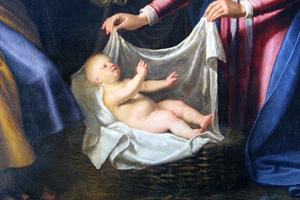God Was Crucified — How Is This Hopeful?
We cling to the hope that we too will be taken up in the resurrection of Our Lord

God is crucified. He has died. Today, we remember that Truth was crucified. Love was crucified.
Take a moment and imagine something with me.
Imagine how the crucifixion of Jesus looked to the disciples. It seems the father of lies has won. Death and indifference have won. The great Messiah, my long-awaited leader and king is dead. Imagine how the disciples must have felt. Can you feel their loss, their confusion, their agony and desperation, even their despair? They must have felt so oppressed, so lost.
What we're imagining isn't just the disciples, then. We're really coming to know our own lives, now — the lives of our neighbors and friends, our families, our cities … our world. In this postmodern time, in this post-Christian age, for too many people, He just isn't there. God truly seems dead. And no one seems to be mourning.
But there's hope. I have hope. And so should you. Somehow, mysteriously, while truth and love descended into the grave hope did not. Somehow, the great Christian witness to hope remained — like a little child standing beside the grave of her father, waiting for him to wake up, to get up, to hold her — hope stood strong. Because hope trusts. When we remember the crucifixion, we see it through the lens of the glorious resurrection we know is coming. So, we can hope just like the child.
This kind of hope has the power to transform falsehood, hatred, indifference, and apathy into truth and love because hope is transformative. It's not just about things to come. To have hope within us today, changes who we are today. Here, now. Choosing to trust in the face of what so many others think, believe, and assert — that’s the secret. That’s the power of the gospel.
That God is on the cross is no scandal. It’s the key to unlocking everything: every mystery, every confusion, every doubt. And it depends on simple trust. That trust — that hope — is powerful. It explains why, in another small paradox of Good Friday when we grieve at the loss of Christ on the cross, we cling to the hope that he promises is ours to keep. We cling to the hope that we too will see his resurrection and be taken up in his resurrection.
- Keywords:
- hope
- good friday

















